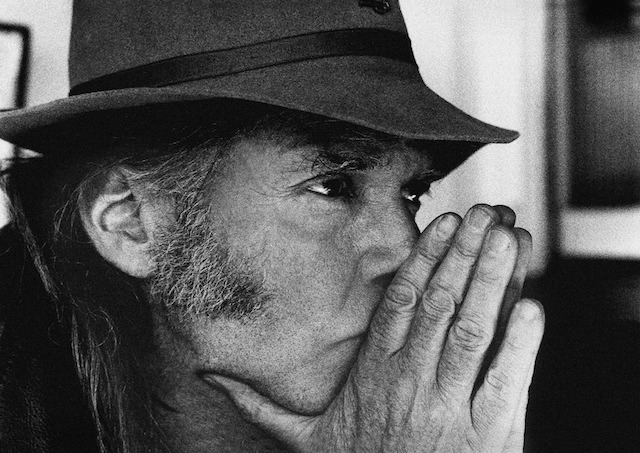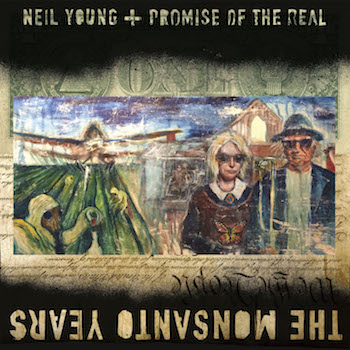Rockin' Our Turntable: Neil Young & Promise Of The Real 'The Monsanto Years'
By Chicagoist in Arts & Entertainment on Jul 12, 2015 6:00PM

Neil Young, photo by Pegi Young
Neil Young has been confounding and testing his audience for nearly a half century now, so when the musician dropped the hint that his new project would be a concept album about agrochemical titan Monsanto nobody was necessarily shocked. The man has always gone against the corporate Goliath whether it was "audio"-related (Apple and the MP3) or "auto"-related (gas companies). His fight for the independent farmer has been going on for years, since 1985 when he co-organized the first Farm Aid benefit concert. So Monsanto, the leading producer of genetically-engineered seed and herbicide, seems like a natural (or unnatural, if you will) target for the songwriter.
The shocking thing about The Monsanto Years, his new album released in conjunction with the band Promise Of The Real, is just how much fun he is having sticking it to the "man." Last year found Young releasing an album recorded in a 1947 Voice-O-Graph vinyl recording booth (A Letter Home) and a bloated, over-arranged collection about his obsession with cars (Storytone). Both albums found him in a sobering, serious mood, and the material suffered because of it. This new album, though, finds Young having fun jamming with his friends again, something that could arguably be his strong suit.
The recordings sound natural, unhurried and loose, while the lyrics are Young's usual hamfisted and simple critiques on the agricultural industry—he is the crazy uncle that you can't wait to hear rant at the Thanksgiving table. Luckily, on The Monsanto Years Young peppers his diatribes with a healthy helping of humor to make the whole package go down smooth.
 Promise Of The Real, featuring two of Willie Nelson's sons, Lukas and Micah, doesn't try to replicate Crazy Horse's simplistic psych-grunge. Instead the band brings jam-band chops while also getting out of Young's way, providing the perfect amount of muscle for him to pile his riffs on top of, as on the title track where Young lays down a classic lead guitar riff that sounds like it could have been an outtake from classic albums like Zuma or Everybody Knows This Is Nowhere. On "A Rock Star Bucks A Coffee Shop" (get the joke?), the whole band whistles in harmony during the chorus while the verses find plenty of Young's one-liners like "Yeah I want a cup of coffee but I don't want a GMO, I'd like to start off my day without helping Monsanto."
Promise Of The Real, featuring two of Willie Nelson's sons, Lukas and Micah, doesn't try to replicate Crazy Horse's simplistic psych-grunge. Instead the band brings jam-band chops while also getting out of Young's way, providing the perfect amount of muscle for him to pile his riffs on top of, as on the title track where Young lays down a classic lead guitar riff that sounds like it could have been an outtake from classic albums like Zuma or Everybody Knows This Is Nowhere. On "A Rock Star Bucks A Coffee Shop" (get the joke?), the whole band whistles in harmony during the chorus while the verses find plenty of Young's one-liners like "Yeah I want a cup of coffee but I don't want a GMO, I'd like to start off my day without helping Monsanto."
The bonus DVD content shows Young and company laughing, goofing around in the studio and generally having a blast. The introduction to the hour-long video reads "No auto tune or vocal booths were used in this recording," with later content focused on the group recording gang-style vocals while drinking coffee (not Starbucks of course) and mimicking the lyrics. The bond between Young and this new band is something not seen from him since 1995 where he borrowed the guys from Pearl Jam to back him up on the album Mirror Ball. The same loose and fun feeling pervades this album as well.
Do the politics get in the way of the fun? Any other political singer to try and tackle the agrochemical issues of Monsanto would have come off as a real bummer (think John Mellencamp), but Young knows that to shine a light on an issue, he also needs to provide a quality piece of music underneath his musings. "People Want To Hear About Love" may be about that struggle to simultaneously entertain and educate—most people just want to hear a simple love song, not a political diatribe. So Young also gives us a handful of catchy barn burners that have been his bread and butter for decades.
While The Monsanto Years doesn't match the dizzying heights of his 2012 mega-opus Psychedelic Pill (with Crazy Horse) or his ten or so five-star albums, it finds Young stronger and happier than he has been in years. The heavy-handed lyrical onslaught could have been disastrous, instead it's just another one of his interesting left-turns.
By: Andy Derer